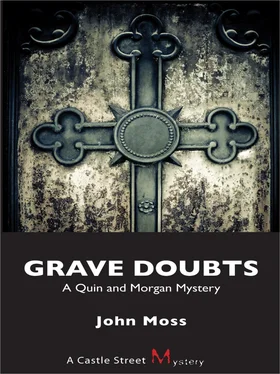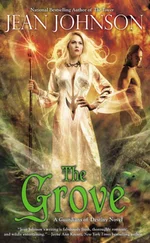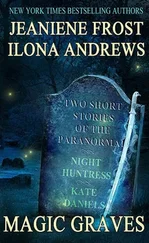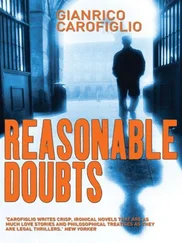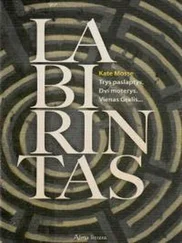John Moss - Grave doubts
Здесь есть возможность читать онлайн «John Moss - Grave doubts» весь текст электронной книги совершенно бесплатно (целиком полную версию без сокращений). В некоторых случаях можно слушать аудио, скачать через торрент в формате fb2 и присутствует краткое содержание. Жанр: Криминальный детектив, на английском языке. Описание произведения, (предисловие) а так же отзывы посетителей доступны на портале библиотеки ЛибКат.
- Название:Grave doubts
- Автор:
- Жанр:
- Год:неизвестен
- ISBN:нет данных
- Рейтинг книги:4 / 5. Голосов: 1
-
Избранное:Добавить в избранное
- Отзывы:
-
Ваша оценка:
- 80
- 1
- 2
- 3
- 4
- 5
Grave doubts: краткое содержание, описание и аннотация
Предлагаем к чтению аннотацию, описание, краткое содержание или предисловие (зависит от того, что написал сам автор книги «Grave doubts»). Если вы не нашли необходимую информацию о книге — напишите в комментариях, мы постараемся отыскать её.
Grave doubts — читать онлайн бесплатно полную книгу (весь текст) целиком
Ниже представлен текст книги, разбитый по страницам. Система сохранения места последней прочитанной страницы, позволяет с удобством читать онлайн бесплатно книгу «Grave doubts», без необходимости каждый раз заново искать на чём Вы остановились. Поставьте закладку, и сможете в любой момент перейти на страницу, на которой закончили чтение.
Интервал:
Закладка:
Miranda had listened, pleased by his confidence although perturbed by his proprietorial description of the frescoes as his. She agreed with the implication, in any case, that the pilgrims were the lifeblood of the place — the living manifestation of the story’s vitality, if not its veracity.
“Where do you think he is?” Rachel asked, gazing around from their vantage beside the open grave in the floor. “This place is eerie. It gives me the creeps.”
Miranda grimaced. This was where the altar would have been, she thought. Instead, there’s a hole. She followed Rachel’s gaze and saw a vast empty vault of grey stone and white plaster, with light washing through narrow windows, catching myriad dust motes hovering in the air. There was a strong smell of solvents, and a hint of violets emanating from the cavity in the floor at their feet. They could not see Alexander’s pictures without stepping off the chancel, although Miranda noted that his scaffolding on the far side of the nave was still in front of the last panel, where the font for holy water might have been. Or did Catholics place the font somewhere else?
“Come on,” she said. “I’ll show you the frescoes. Let’s start at the other end — you’ll get them in sequence.” She walked over to a switch by the sacristy door and flipped it on. The entire building suddenly flooded with illumination, staunching the flow of natural light seeping through the windows and bringing the colours of the pictures into striking incandescence. As they moved from panel to panel, Miranda made a few comments, but Rachel was already familiar with the story.
“My God, they’re wonderful,” said Rachel. “I had no idea. I love the changes in her face. It’s the same face and yet it gets more and more radiant. She’s almost homely in the first panel, pretty maybe, and by the last she’s Botticelli at his most inspired, but it’s the same face, the same painter, same technique. Wow. The settings aren’t Botticelli — they’re pure Ontario Gothic — but the faces are Italian Renaissance, especially in the last two panels, and somehow they fit with the scenes.”
“How do you know so much?” exclaimed Miranda.
“I’ve got eyes. Look at her.”
“I see, I agree. But — ”
“When I studied art history at Western, I spent two months in Florence for a double course credit, mostly walking around the Uffizi or drinking Chianti.”
“Something obviously sunk in. Botticelli? That’s neat, because she looks late-Victorian to me, sort of Pre-Raphaelite, but yeah, I can see the face in Botticelli’s… what’s it called?”
“The Primavera.”
“No, the one with Venus poised on the half shell.”
“What about you? How do you know such erudite things?”
“I’m old… I paid attention… I don’t know. I’ve never been to Italy.”
“Well, girl, you must go. There’s no place in the world like Florence — Firenze! Unless it’s Sienna — we spent almost a week in Sienna. Not so touristy, great buildings, lovely textures, like you’re walking through architectural history. Italians, they live inside history. Why don’t we go sometime? I’ll show the old girl around.”
“One thing I like about me is my age. And when I turn forty, I’ll like that too.”
“And fifty and sixty and seventy?”
“You bet.”
“So tell me,” said Rachel, almost whispering as she looked around over her shoulder and then leaned in conspiratorially.
“What?”
“Why isn’t Alexander Pope a suspect?”
“He checked out.”
“And?”
“He’s our friend.”
“So?”
“No motive.”
“Shelagh Hubbard wreaked havoc without a motive.”
“She’s a psychopath.”
“Was.”
“Was. Psychopaths don’t have motives. That’s why they’re psychopaths.”
“Did you decide she was a psychopath before or after you couldn’t come up with a motive?”
“Point taken. But you should read her journals. There’s an absolute absence of conscience.”
“Clinically detached?”
“Morgan described them as ‘self-justifying.’ More like an application for a research grant.”
“Detailed and aggressively impersonal?”
“Yes. And no. I don’t find them impersonal. They’re not emotional, but she’s there in every word and sketch and turn of phrase. I find them chilling precisely because she is there in her text and yet shows no emotion.”
“Sounds psychopathic to me. So, back to our friend Alexander.”
“There’s no evidence here or at the farm.”
“Not of his presence, but not of anyone else, either.”
“There’s no reason to connect him to her death. As far as the melodramatic disposal of her body, it’s unlikely a man so immersed in recovering the story of this place would violate his own project. I mean, why?”
“Why not? He had opportunity on his side, and maybe there’s a perverse satisfaction, bringing his saint to life.”
“Dead. She was brought here dead.”
“Figure of speech, dear. Confusing, isn’t it? New bodies passing for old — that was Hubbard’s specialty. It’s fitting and proper that hers should be used for the same.”
“Agreed,” said Miranda. “Someone’s idea of poetic justice. But not Alexander’s — the connection’s so obvious it’s untenable.”
“I’m glad you’re on side,” said Alexander Pope, stepping out from behind one of the columns separating them from the nave.
“Good God,” Rachel shrieked, recovering immediately with a muffled laugh. “How long have you been there?”
“Just arrived, just arrived. Had no time to hear accusations — ”
“Suspicions!”
“Suspicions, my darling Rachel, are the poor cousins. Same family. I stand accused. And — thank you Miranda — exonerated.”
“Oh, hell,” said Rachel. “I guess you didn’t do it then. What a relief.” She leaned up and kissed him, first on one cheek, then the other. “I’m glad. I could cope with the killing part, but embalming, yuck. Even embalming with violets. Doesn’t seem an Alexander Pope thing to do. ’Course, you have an ancestral interest in gardens.”
“And in couplets that rhyme. That doesn’t mean I go around coupling.”
Miranda looked from Alexander’s face to Rachel’s. He obviously did not feel threatened by her and she was not intimidated by him. In fact, there seemed to be an indefinable current between them, Miranda thought, that despite their radical differences in character and world experience suggested they were, as they say, kindred spirits. Stupidly, she felt excluded.
Alexander Pope turned to her. “Well, Miranda, what do you think? The place is looking good, isn’t it? Wouldn’t it make a lovely gallery? I’m thinking of moving up here and turning myself into a purveyor of fine art.”
“And leaving Port Hope? I don’t believe it.”
“No, probably not. Maybe for the summers. I could sell antiques here, and spend the winters at home making more. Ha!”
“Ha!” she responded, feeling a lovely bond of intimacy, scolding herself for having felt left out.
“Reproductions!” Rachel challenged.
“I’m getting too old to be rebuilding old buildings,” he countered. “I need to fall back on old talents.”
“What’s with you about old? Both of you, in your dotage. Good grief, consider the alternative.”
“I have and I do,” Pope responded gravely. “All too often.”
“What would your patrons think of a gallery?” Miranda asked.
“My patrons? My angel. Oh, well, I can do with this place pretty much what I want, I suppose.”
“Does that include burying a saint in the floor?” said Rachel.
“Sinner, my dear. If there ever was a sinner, it was the late Dr. Hubbard.”
Читать дальшеИнтервал:
Закладка:
Похожие книги на «Grave doubts»
Представляем Вашему вниманию похожие книги на «Grave doubts» списком для выбора. Мы отобрали схожую по названию и смыслу литературу в надежде предоставить читателям больше вариантов отыскать новые, интересные, ещё непрочитанные произведения.
Обсуждение, отзывы о книге «Grave doubts» и просто собственные мнения читателей. Оставьте ваши комментарии, напишите, что Вы думаете о произведении, его смысле или главных героях. Укажите что конкретно понравилось, а что нет, и почему Вы так считаете.
